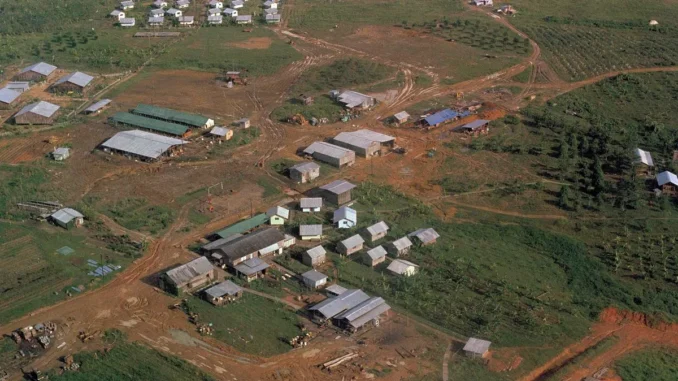
Jonestown cult massacre site where 900 died eyed for tourist redevelopment
The Jonestown massacre site in Guyana, infamous for the tragic deaths of over 900 members of the Peoples Temple cult in 1978, is reportedly being considered for redevelopment as a tourist destination. This controversial plan has sparked intense debate about the ethics of memorializing such sites of tragedy.

The Jonestown tragedy remains one of the most devastating cult-related events in modern history. Led by the charismatic yet manipulative Jim Jones, the Peoples Temple was initially established as a progressive religious movement in the United States, emphasizing racial equality and social justice. However, Jones’s increasing paranoia and authoritarian control led the group to relocate to a remote settlement in the jungles of Guyana. There, the community lived under oppressive conditions, culminating in a mass suicide-murder orchestrated by Jones. On November 18, 1978, over 900 people, including hundreds of children, died after drinking a cyanide-laced beverage.
The potential redevelopment of Jonestown into a tourist site raises complex questions about how societies handle the memory of dark historical events. Proponents argue that such sites can serve as educational tools, providing insight into the dangers of cults and authoritarian control. By preserving the site, they hope to honor the victims and create a space for reflection and understanding.
Critics, however, express concern over the commodification of tragedy. Turning Jonestown into a tourist attraction could risk sensationalizing the event or diminishing the profound suffering experienced by the victims and their families. Ethical considerations also arise over who controls the narrative and whether profits from such redevelopment would benefit affected communities or local residents.
Similar examples of dark tourism, such as the Auschwitz-Birkenau Memorial in Poland or the 9/11 Memorial in New York, show that tragedy sites can become significant spaces for remembrance and education. However, achieving this balance requires careful planning, transparency, and respect for the sensitivities involved.
The Guyanese government and stakeholders have yet to finalize plans for the site, and consultations with survivors, historians, and ethicists are likely to play a key role in shaping the project. As the debate continues, Jonestown serves as a poignant reminder of the devastating consequences of unchecked power and manipulation. Whether as a memorial, educational site, or tourist attraction, its future will carry profound implications for how we remember and learn from history’s darkest chapters.
Leave a Reply